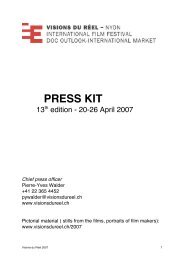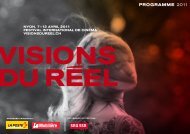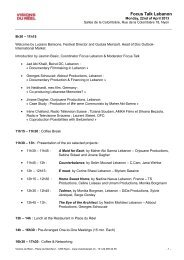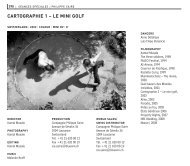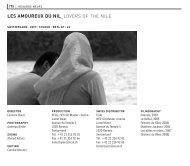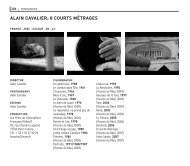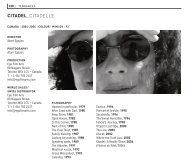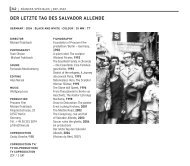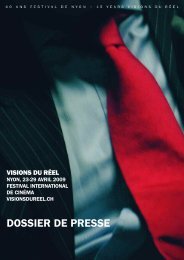Katalog 2013.pdf - Visions du Réel
Katalog 2013.pdf - Visions du Réel
Katalog 2013.pdf - Visions du Réel
You also want an ePaper? Increase the reach of your titles
YUMPU automatically turns print PDFs into web optimized ePapers that Google loves.
220 atelier – eyal sivan<br />
izkor<br />
is because I stay outside. The second is<br />
because I keep a permanent link inside,<br />
my teaching in Israel which allows me<br />
to meet young people and to hold my<br />
seminar, which has been the same for<br />
years and it’s called “What Do We See<br />
When We Watch” This is just to discuss<br />
the possibility of subjectivity. We<br />
are in a terrible situation in which subjectivity<br />
is admitted only when it comes<br />
to fiction. You are not allowed to have<br />
a subjective take on reality. As if the<br />
common discourse were an objective<br />
take. This is maybe the most terrifying<br />
aspects of the situation in Israel. You<br />
only have the dominant point of view,<br />
and if you try to differentiate yourself<br />
from it, the first thing that you have to<br />
do is to acknowledge it. The only way<br />
to propose a different point of view is<br />
to point out propose a different point<br />
of view you have to point out “This is<br />
me speaking subjectively.” This maybe<br />
explains why in Israel we have so many<br />
political films made in the first person.<br />
This is maybe a way to protect yourself<br />
by saying: “This is just me.” I believe<br />
that Avi Moghrabi is one of the greatest<br />
Israeli filmmakers. He has a signature.<br />
A project. But to be on the inside<br />
he has to point out all the time: “This is<br />
me.” It is the only way to be accepted. In<br />
a way, it is the only way to be heard: to<br />
re<strong>du</strong>ce your point of view to a specific<br />
indivi<strong>du</strong>al one.<br />
Coming back to Jaffa, which is not a<br />
first person film, the accusation is: “It<br />
is not objective. It is a lie, a historical<br />
falsification.” The same happened for<br />
Un Spécialiste or Etat commun. The<br />
pattern of criticism in Israel against my<br />
films is always the same. It’s never discussing<br />
what the films are about, saying<br />
or showing. The same happened<br />
with the exhibition that I made about<br />
the perpetrators. The question was<br />
not about the testimonies of the war<br />
crimes but: “Did I tell the truth” The<br />
problem is always about my opposition<br />
to a supposedly objective point of view.<br />
In Israel, in Hebrew, we use a strange<br />
word to criticise something. We say it<br />
is intentional, which means it is biased.<br />
‘Megamati’. Where ‘megama’ means<br />
intention. Wherever my films have been<br />
discussed, the arguments have revolved<br />
around the fact that I was ‘megamati’,<br />
‘intentioned’. Even in Parliament, where<br />
my films have been discussed, the main<br />
accusation was that I was a filmmaker<br />
with intentions. To which I obviously<br />
answer: “Of course I’m intentioned.”<br />
What is the meaning of a film without<br />
intention A comedy without intention<br />
If you look at it from the outside, it<br />
seems like a weird position. But on the<br />
inside nobody thinks it is bizarre. This<br />
means there is a common notion of<br />
objectivity. This is maybe the very first<br />
characteristic of fascism. A norm which<br />
is the same from north to south, from<br />
east to west. Up or down. A rule. Or if<br />
you want it in cinematic terms: a frame.<br />
Interview made over Skype<br />
On January 11th 2013<br />
Giona A. Nazzaro



